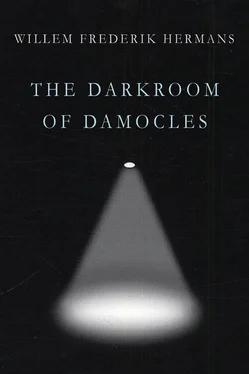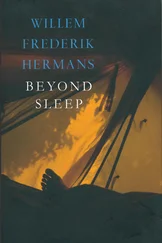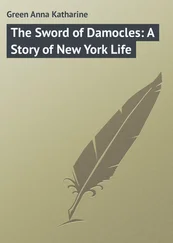They were approaching Schiphol airport. The fields were green. Here and there Luftwaffe listening posts pricked up their gigantic ears, but the sky was quite empty. Krügener now kept glancing at Osewoudt, and the car lost speed.
‘My chatter doesn’t interest you. You are still sunk in your sad thoughts. I am only talking to distract you, please excuse me.’
He stopped at the side of the road and switched off the engine. Then he reached under the seat for a bottle of rum and removed the cork.
‘I haven’t got a glass, I’m afraid. It would be in poor taste to offer you the bottle.’
He giggled like a child and took a swig himself.
Osewoudt said: ‘Don’t mind me. I don’t drink.’
Krügener put the cork back in the bottle, and said: ‘Now I can say what I’ve wanted to say all along. Please believe me, it is no coincidence, my speaking to you. I dreamt of you last night. I saw you sitting just as you are now, but you were dressed in black, with a black veil. Your hair was longer, it came down on either side of your face. You were sitting on a cart with two big wheels, drawn by a thin horse. It was on a lonely country road. You were holding out your hands and crying. You were on the way to the guillotine, although this was all happening in the present. There were American soldiers in front of the cart and also behind. They wore camouflage gear, and had automatic weapons and hand grenades hanging off them. Their helmets, covered with netting, had dry twigs poking out. They resembled walking storks’ nests. It was like some kind of slow procession coming towards me. I saw everything from a low viewpoint, because I was lying in a ditch beside the road. I wanted to get up to save you, but couldn’t move. The horse’s hooves kicked grains of sand into my eyes. Can you make sense of a dream like that?’
Osewoudt shrugged.
Krügener took another swig; his hands were shaking.
‘Do you know what dirty horse’s hooves smell like? The smell was far worse than I ever noticed in real life. Oh! Hölderlin says: man is a god when he dreams, a beggar when he thinks.’
‘Then I’d sooner be the beggar,’ said Osewoudt. ‘What happens to a god when he wakes up? He’s either hanging on a cross like a scarecrow or lying in a ditch, like you.’
‘My dream didn’t end there,’ said Krügener. ‘I woke up briefly and then dropped off again, and it went on. Your head had been chopped off and came rolling towards me. I knew it was yours, though I couldn’t see that because it had got wrapped up in the veil as it rolled. It came to a stop right next to me. More American soldiers appeared, advancing in loose formation. They had mine detectors, and were slowly and carefully scanning the ground. They took one step forward at a time, sweeping their instruments from side to side before taking the next step. I knew what they were looking for, but I kept quiet. They didn’t notice me. When they had gone past, I unwound the veil. It was your head all right, only, at the same time it was the head of a man: a man with black hair. The cheeks had thick black stubble.’
He took another swig from the bottle.
Somewhere in the distance, out of sight, the drone of aeroplanes began.
‘The Americans,’ said Osewoudt. ‘Let’s drive on before they shell us.’
Krügener replaced the cork in the bottle, put it back under the seat, started the engine and drove off. The drone grew louder. There must have been quite a number of planes, because they were not in sight and yet made so much noise. There was the occasional flash as from a diamond in the sky, nothing more. Parallel white stripes began to appear overhead, as if the blue were being inscribed with musical staves, but the planes themselves stayed out of sight, and there was no shelling.
As they reached Leiden Osewoudt said: ‘Since we’re in the neighbourhood, I’d like to take this opportunity to pass a message to some friends of mine in Voorschoten.’
‘Voorschoten? I don’t know where that is.’
‘I’ll show you the way. You can follow the tramline, it’ll lead you straight there. I don’t suppose the trams are still running, but you’ll still see the tracks.’
They followed the rusty tramline.
It was after six when they went past the silver factory. From there he could see the steeple of the Reformed church, which looked like an upended Zeppelin. Then the low medieval tower of the church of St Willibrord.
They passed the police station and reached the stop where the tramlines sidle towards each other until they overlap in a single track. He read the sign: NO OVERTAKING.
There were no vehicles or carts in the narrow high street, nor any oncoming traffic.
‘Stop here!’ yelled Osewoudt.
Krügener slammed on the brake, too drunk to pull over to the side of the road. The car stopped on the tramlines.
‘Couldn’t you borrow a glass from your friends?’ Krügener whined. ‘I’d love to pour you a drink …’
Osewoudt snatched the key from the ignition, got out of the car and made straight for the tobacco shop.
The first thing to catch his eye was a small notice: CIGARETTE PAPERS SOLD OUT.
In the display he saw some open cardboard boxes containing strips of tightly rolled paper: CHEWING STICKS FIFTEEN CENTS. There were also a couple of paper bags on their sides, from which spilled green hay. The roller blind over the door-pane was up. He could see there was no one in the shop. He opened his shoulder bag, took out the knife and slipped it into his right-hand coat pocket. Then he reached for the door handle. It gave way.
The bell did not tinkle as he stepped inside. The leaded glass sliding doors to the back room were closed. Osewoudt pushed one of the doors aside.
There was Ria! She looked up from an ironing board and set the iron upright. Thin curls of steam rose from it.
Her jaw dropped, exposing her teeth which looked longer than ever, rather like matchsticks protruding from her jaws.
Osewoudt slowly shut the sliding door behind him, keeping his eyes fixed on Ria. His arms and legs began to shake; he felt the nurse’s cap wobble on his head. From the corner of his eye he took in the rest of the room. The furniture had changed. It was new. Where had she got it?
Then a noise escaped from his throat, he didn’t know what sort of noise it was.
Ria said: ‘Sister! You gave me quite a turn! You reminded me so much of my first husband!’
Once her screams had stopped there was no further sound in the house.
She lay on the floor beside the ironing board. Osewoudt wiped the knife on everything within reach: clothes waiting to be ironed, tablecloth, lampshade, it was as if he wanted to spread Ria’s blood all over the house. Then he stood still for a moment, panting, and stuffed the knife in his coat pocket. He went to the front of the shop, parted the short curtains at the back of the display, and peered outside.
Krügener’s car was beginning to attract attention. Looking over it were two boys, lounging against the crossbars of their bikes, which had wooden tyres. Now and then they called out to the driver, and laughed. Three girls, arm in arm, came clattering along and halted in front of the car. They giggled at the boys.
Osewoudt took a step back and shut the curtains.
‘Turlings! Turlings!’ he called. But he had already guessed that the chemist’s son was not there.
It grew darker in the shop because people were gathering in front of the window and perching on the sill. He could see their hair protruding over the top of the short curtains.
He took a deep breath, made for the door and seized the handle. Just above it the enamel plaque was still there: HAVE YOU FORGOTTEN ANYTHING?
He pulled the door open, shut it quickly behind him and ran to the car. The crowd of onlookers was swelling to mob proportions. Voices were raised, there was even some shouting. He didn’t catch what they were saying. Osewoudt opened the passenger door. Just then Krügener threw the empty rum bottle out of the car window on the other side. He slumped diagonally against the seat back, twisted round to face Osewoudt, and said: ‘I thought you were going to stay there, with your lover.’
Читать дальше












